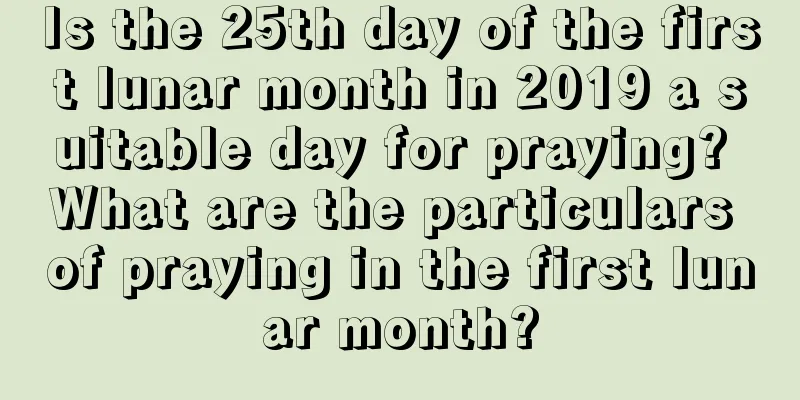The origin and customs of the White Dew solar term, and the importance of naming the 24 solar terms

What are the origins and customs of the White Dew solar term, and what are the rules for naming the 24 solar terms? The White Dew solar term is also known as the August Festival. It is the eighth month of the lunar calendar, the mid-autumn weather. The golden wind is rustling, the jade dew is falling, and autumn has arrived quietly. So what should we pay attention to in August of the lunar calendar in 2019? If you want to know more exciting content, please visit Mr. Shui Mo’s website!The Origin and Customs of the White Dew Solar Termorigin:"Collected Explanations of the 72 Seasonal Changes" says: "In the eighth month... the yin energy gradually becomes heavier, and the dew condenses and turns white." As the weather gradually turns cooler, you will find many dewdrops on the ground and leaves in the early morning. This is because water vapor condenses on them at night, hence the name White Dew. The ancients matched the four seasons with the five elements. Autumn belongs to gold, and gold is white, so white is used to describe autumn dew. custom: King Yu is the legendary flood control hero Dayu, who is called "the God of Waterways" by fishermen on the shores of Taihu Lake. Every year on the eighth day of the first lunar month, Qingming Festival, the seventh day of the seventh lunar month and the White Dew Festival, incense ceremonies to worship King Yu are held here. Among them, the Qingming Festival and the White Dew Festival in spring and autumn are the largest, lasting for a week. The Etiquette of Naming the 24 Solar Terms♥“Li” means the beginning of the season. The Beginning of Spring, the Beginning of Summer, the Beginning of Autumn and the Beginning of Winter are collectively called the "Four Beginnings". In the Gregorian calendar, it usually falls around February 4, May 5, August 7 and November 7 every year. The "Four Beginnings" indicate the beginning of astronomical seasons. From a climatic point of view, it is generally still the previous season. For example, the Yellow River Basin is still in the depths of winter at the beginning of spring.♥“至” means extreme or most. The summer solstice and the winter solstice are collectively called the "two solstices", indicating the extremes of summer and winter. The summer solstice and winter solstice usually fall on June 21 and December 22 of the Gregorian calendar each year. During the summer solstice, the sun is directly above 23.5 degrees north latitude and 90 degrees ecliptic longitude, and the daytime in the Northern Hemisphere is the longest. On the winter solstice, the sun is directly above 23.5 degrees south latitude and 270 degrees ecliptic longitude, and the daytime in the Northern Hemisphere is the shortest. ♥“分” here means to divide equally. The vernal equinox and the autumnal equinox are collectively called the "two equinoxes", indicating that the day and night are equal in length. These two solar terms usually fall around March 20 and September 23 of the Gregorian calendar each year. During the vernal and autumnal equinoxes, the ecliptic and the equatorial plane intersect. At this time, the ecliptic longitudes are 0 degrees and 180 degrees respectively. The sun is directly on the equator, and the day and night are equal. The time of different solar terms in four seasons:Spring: Spring rain brings spring and clear skiesBeginning of Spring: January 3-5; Rain Water: February 18-20; Waking of Insects: March 5-7; Vernal Equinox: March 20-22; Qingming Festival: April 4-6; Grain Rain: April 19-21. Summer: Summer is full of wheat and summer heat is connected Beginning of Summer: May 5-7; Grain in Ear: May 20-27; Grain in Ear: June 5-7; Summer Solstice: June 21-22; Lesser Heat: July 6-8; Greater Heat: July 22-24. Autumn: Autumn dew, cold and frost Beginning of Autumn: August 7-9; End of Heat: August 22-24; White Dew: September 7-9; Autumnal Equinox: September 22-24; Cold Dew: October 8-09; Frost Descent: October 23-24. Winter: Snow, slight and severe cold Beginning of winter: November 7-8; Light snow: November 22-23; Heavy snow: December 6-8; Winter Solstice: December 21-23; Lesser Cold: January 5-7; Greater Cold: January 20-21. The fate at birth is fixed, but people born at the same time will be different later in life because their fortunes change. Making different choices at the same time will naturally lead to different results. Go to the [ Premium Calculation ] below to see when your next great fortune will come. |
>>: What is the exact time of Bailu in 2019? What is the exact time of Bailu in 2019?
Recommend
Can I get a marriage certificate on the day of Xiaoxue in 2019? Is there a time limit?
Obtaining a marriage certificate means officially ...
Two interesting stories about ancient Feng Shui: Emperor Zhu Di of the Ming Dynasty moved the capital to Beijing
Introduction: When we were young, we liked to list...
Is September 19th of the lunar calendar in 2020 an auspicious day?
Is September 19th of the lunar calendar in 2020 a...
June 27, 2019 auspicious time, good and bad time query
The sixth lunar month has already entered summer ...
Is Father's Day 2019 a suitable day to sign a contract for buying a house? When is Father's Day?
Introduction: In our country's traditional cul...
Is the Civil Affairs Bureau open on the 13th day of the lunar year? Is it a good day to get the certificate?
Every day has its good and bad days. If you want t...
Query the position of the God of Happiness on the 24th day of the sixth lunar month in 2020
June is a hot month and the lotus flowers are in ...
What is the fate of people born in the Year of the Horse on New Year’s Day in different years? OK?
What is the fate of those born in the Year of the ...
What is the fate of a boy born on the third day of the sixth lunar month in the Year of the Dog in 2018?
Introduction: Different lives are born on differen...
Can I get a haircut on Tuesday, April 20, 2020 in the lunar calendar? Is the hexagram a good sign?
Daily lunar calendar items include: date, taboos, ...
Detailed explanation of the position of the God of Wealth on October 25th of the lunar calendar in the Year of the Rat 2020!
The tenth month in the lunar calendar is named De...
Is it not a suitable day to set up the bed today, the fifth day of the fourth lunar month in the Year of the Rat 2020?
Introduction: According to the tradition of our co...
Is the day before Frost Descent in 2019 a good day? A complete collection of poems about Frost Descent!
Introduction: Every day has its good and bad luck,...
Is August 14th of the lunar calendar 2021 an auspicious day? How about getting engaged?
The pros and cons of getting engaged at different ...
Is it a bad idea to get a haircut on April 29th of the lunar calendar in 2018? What are the precautions for getting a haircut?
The word "haircut" has not been around f...









